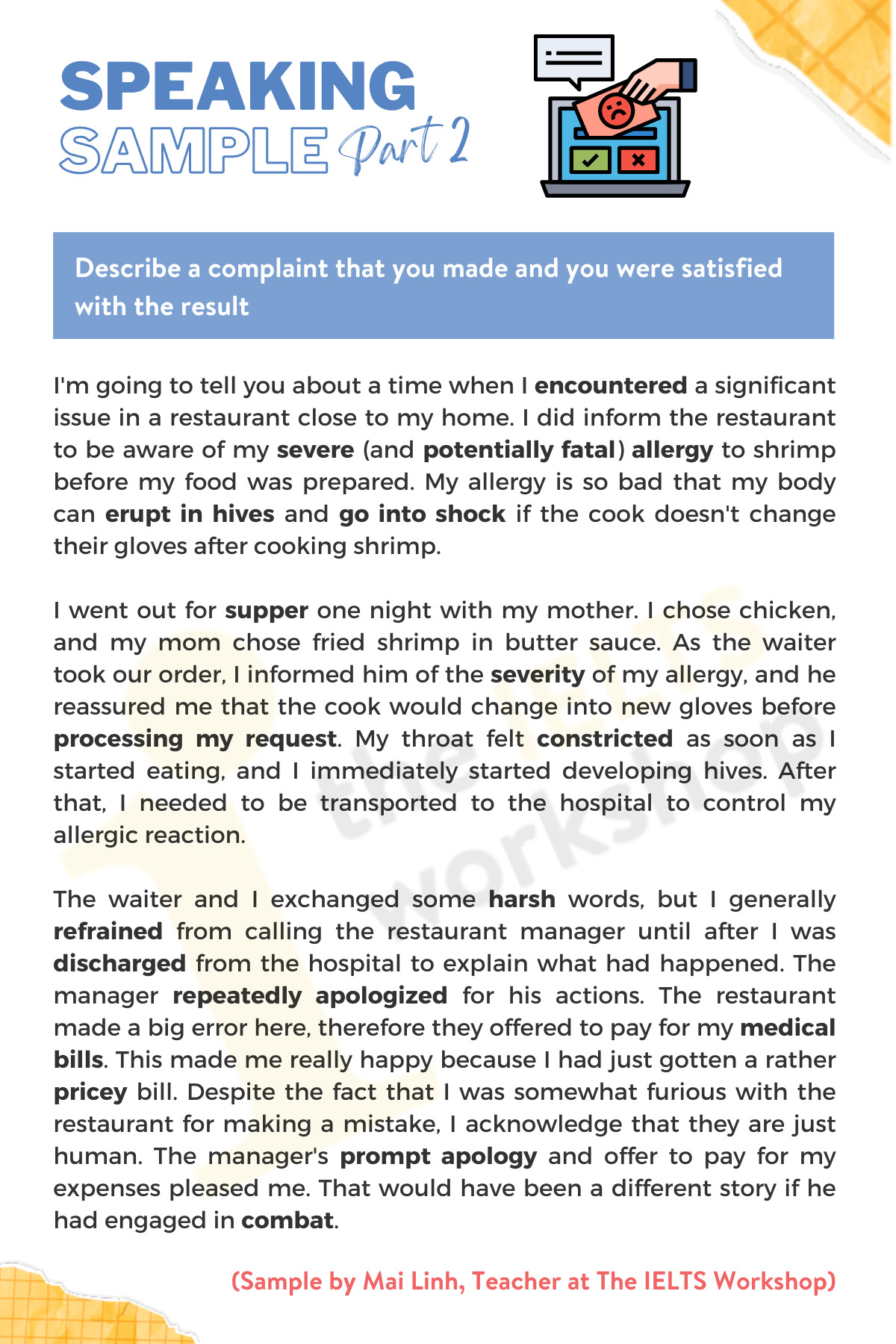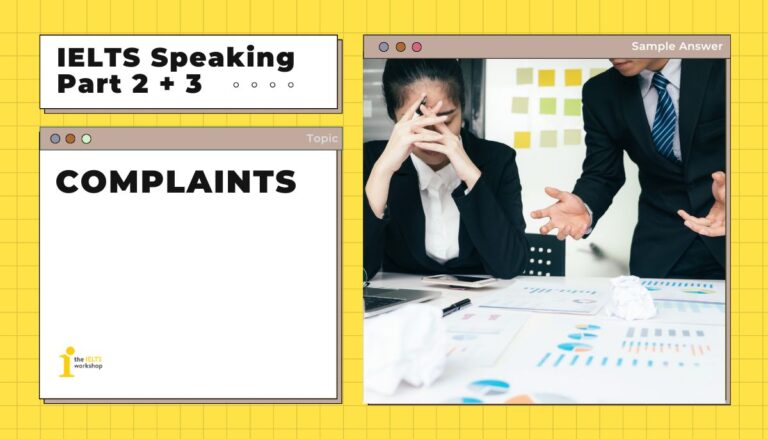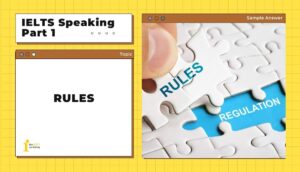Dưới đây là bài mẫu cho chủ đề Describe a complaint that you made trong IELTS Speaking Part 2 & 3 do cô Mai Linh của The IELTS Workshop gợi ý. Cùng tham khảo một vài cách diễn đạt ghi điểm trong phần thi IELTS Speaking nhé.
Part 2: Describe a complaint that you made
Describe a complaint that you made and you were satisfied with the result
You should say:
When it happened
Who you complained to
What you complained about
And explain why you were satisfied with the result
Dưới đây là bài mẫu cho topic “Describe a complaint that you made and you were satisfied with the result“.
1. Bài mẫu (Sample Answer)

2. Từ vựng (Vocabulary Highlight)
- encountered: đã gặp
- severe: nghiêm trọng
- potentially: có khả năng
- fatal: tử vong
- allergy: dị ứng
- erupt in hives: nổi mề đay
- go into shock: bị sốc
- supper: ăn tối
- processing my request: xử lý yêu cầu của tôi
- constricted: hạn chế
- harsh: thô ráp
- refrained: kiềm chế
- discharged: ra khỏi
- repeatedly: nhiều lần
- apologized: xin lỗi
- medical bills: hóa đơn y tế
- pricey: đắt tiền
- prompt apology: lời nhắc xin lỗi
- combat: cãi nhau
Part 3 Sample: Describe a complaint that you made
Bên cạnh Part 2, bạn hãy tham khảo thêm Part 3 cho chủ đề Complaint – IELTS Speaking này nhé
1. When are people more likely to make complaints?
2. What do people often complain about?
3. Which one is better when making a complaint, by talking or by writing?
4. Who are more likely to make complaints, older people or younger people?
5. How would you react if you received a poor service at a restaurant?
6. How do people often respond to poor customer service?
1. When are people more likely to make complaints?
People may be more likely to complain when they are experiencing negative moods. Sometimes people complain as a way to manage their emotions. By venting their feelings, they hope to lessen the severity of these distressing emotions. However, the problem with this is that people complain more when they are in a bad mood. Their complaining then leads to further negative moods, creating a vicious cycle. Furthermore, other people can also influence how often people complain. Being around people who tend to complain a lot can make people more likely to air their own grievances because shared complaining serves as a form of social bonding.
- venting their feelings: trút cảm xúc của họ
- severity: mức độ nghiêm trọng
- distressing: đau khổ
- a vicious cycle: Một chu kỳ luẩn quẩn
- air their own grievances: lên tiếng về sự bất bình của chính họ
- shared complaining: phàn nàn chia sẻ
- social bonding: gắn kết xã hội
2. What do people often complain about?
Now, there are a lot of issues that people frequently gripe about. Yet, I can point out two significant criticisms that are also frequently generalized to Vietnamese people. The first is significant pollution, and the second is chaotic traffic congestion. We are extremely preoccupied with the heavy traffic and the automobiles’ hazardous and annoying noise, especially during rush hours.
- gripe: phàn nàn
- criticisms: những lời chỉ trích
- generalized: khái quát
- significant pollution: ô nhiễm đáng kể
- chaotic traffic congestion: tắc nghẽn giao thông hỗn loạn
- preoccupied: bận tâm
- hazardous: nguy hiểm
3. Which one is better when making a complaint, by talking or by writing?
It’s not necessary to put a complaint in writing. While it is possible to voice a complaint verbally, it is preferable to do so in writing via letter or email. This makes it easier to ensure that the issues presented are accurately recorded. This is due to the fact that complaining vocally has its drawbacks, as some individuals can be quite nasty, and if a conversation doesn’t produce any results, we will eventually need to complain in writing. Also, it is better to complain in writing if the issue is extremely serious. Then, everything we do will be recorded, and we will be able to file a lawsuit if necessary.
- voice a complaint verbally: lên tiếng phàn nàn bằng lời nói
- drawbacks: nhược điểm
- nasty: bẩn thỉu
- produce any results: tạo ra bất kỳ kết quả
- file a lawsuit: nộp đơn kiện
4. Who are more likely to make complaints, older people or younger people?
Although it seems that older people are more likely to voice their complaints than younger ones, I think that people of all ages have legitimate complaints and are tired of certain parts of modern life. Young people often have little choice but to take their emotions out on those around them due to the demands of school and work. Yet, the elderly may become frustrated for a variety of reasons, such as being unhappy with their own children or grandchildren or having a dispute with their neighbors. It’s challenging to pinpoint the age group that complains the most.
- voice their complaints: lên tiếng phàn nàn của họ
- people of all ages: mọi người ở mọi lứa tuổi
- legitimate complaints: khiếu nại chính đáng
- take their emotions: lấy cảm xúc của họ
- frustrated: bực bội
- having a dispute: có tranh chấp
- pinpoint: xác định
5. How would you react if you received a poor service at a restaurant?
Even if I occasionally gripe, it’s typically only when I’m at a restaurant that I truly enjoy. I do it because I want to return in another day and I want them to address the issue so I can keep dropping by their restaurant. The management must be informed if there is a service issue in order to either improve training for that server or fire them. When I encounter issues at a terrible or average restaurant, I simply don’t return, typically never.
- gripe: phàn nàn
- address the issue: giải quyết vấn đề
- dropping by: ghé qua
- encounter issues: gặp vấn đề
6. How do people often respond to poor customer service?
Usually, people will try to complain to the staff, or the manager. However, they are not really in charge of the restaurant so they may not have the authority to deal with customers. Therefore, people often use social media as a last resort if they can’t get ahold of the situation. They may find the company on Twitter or Instagram and tag the restaurant in a post detailing their poor customer service. If they’re active on social media, they might respond and get the issue fixed. Social media probably isn’t the best bet, and some social media accounts aren’t monitored closely by big brands.
- in charge of: phụ trách
- authority: thẩm quyền
- a last resort: một phương sách cuối cùng
- get ahold of: nhận được
- the best bet: đặt cược tốt nhất
Bài mẫu bởi cô Mai Linh – Giáo viên The IELTS Workshop HN
Trên đây là bài mẫu cho chủ đề Describe a complaint that you made trong IELTS Speaking Part 2 và Part 3. Để luyện tập nhuần nhuyễn cho topic Complaint nói riêng và các topic khác trong IELTS Speaking, các bạn có thể đăng ký Mock test 1-1 tại khóa học Bổ trợ Speaking Mentor của The IELTS Workshop.









